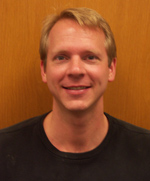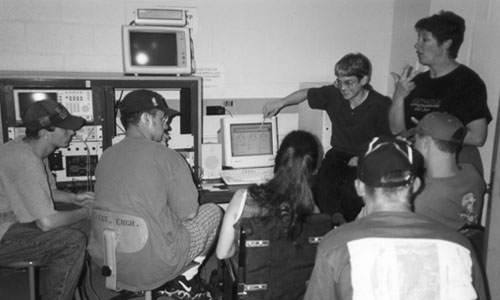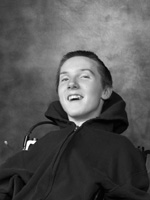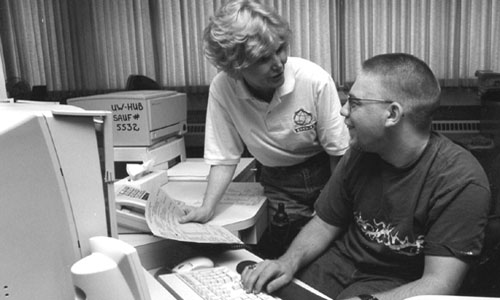A DO-IT Scholar recently posed the following question in our Internet discussion forum. I will share with you some of the responses so that you can get a flavor of the many rich conversations the DO-IT community has online.
What was the biggest challenge that any of you have faced in employment? How did you meet or overcome the challenge?
Mentor: That is a good question. It is difficult to choose just one thing. But I would say that the most difficult things for me regarding transitioning to employment were developing realistic self-confidence at work and developing practical skills in the workplace. Book knowledge and working in a classroom are great, but the real world can be a very different thing. Self-awareness and developing "soft skills" are a good start.
Mentor: Hello Everyone. In response to the question, I haven't had much experience in employment but I will give you some insight on what little I have had. I'd say my biggest challenge in getting and keeping a job would have to be transportation. Since I don't drive (yet, hopefully soon), I have to rely on public transportation which, unfortunately, isn't that great...(for all of you wheelchair users that have heard of Access, you know what I am talking about). Anyway, so far that's my biggest [challenge]. The recent solution I have come up with is working with DVR (Division of Vocational Rehabilitation). They help people with disabilities find employment. It has taken a little while to get things started, but they have found me a couple of jobs already. I am anxious to get out there.
Director Sheryl Burgstahler and Ambassador Ryan, who is now a student at the University of Washington, work together on "DO-IT stuff"
Mentor: It is very important to promote yourself as a qualified individual who would add great value to the company. You should practice interviewing and dress professionally. If your disability is visible, discuss issues frankly and how you have overcome barriers and limitations. Discuss any accommodations that you will bring. You may also want to ask your interviewer if they have additional questions or concerns. Remember to smile!
It is important to note that it is difficult for everyone to find his or her first job. Try not to assume your disability is what was the underlying reason you did not get the job. During school, try to get experience to put on your resume such as internships and volunteer opportunities. Summer jobs are good too. I got my first job from my professor, as he was impressed with my ability. You might want to start networking even while in college. Your professors and guidance center may be a good connection.
Issues will not stop at obtaining a position. Afterwards, you may need to prove yourself to your co-workers. This happens for all employees not just an employee with a disability. However, I have noticed that sometimes it is more important for a person with a disability. I work with many consumers and customers, which is face-to-face interaction. I notice some people have no difficulty accepting me as an equal. However, it is difficult for others. The best thing is to put someone at ease by showing your skills or talking to them in a friendly manner. Try not to take anything to heart, as it is many times a lack of understanding or exposure to people with disabilities.
Other issues that are struggling are not directly related to my position. The problems are PCA [personal care assistant] staffing, the extra energy it takes, transportation, and medical issues. Your personal life will play a part in your ability to effectively complete your job.
When starting a new job, try to figure out what type of accommodations would assist you on the job. If you do not have ideas or experience problems right away, contact your vocational counselor about an on-site job analysis and assessment. I made a mistake of not doing this and ended up doing a patch technology job. Extremely frustrating! I even work in the area of assessment and assistive technology. I preach about accommodations but did not do it for myself. Make sure that you receive training with your accommodations as others may have ideas that you have not considered and without training, it will become less of a benefit...
You may want to talk with your supervisor after several weeks. Discuss your job performance and any problems that have occurred. It is important to be proactive. If you feel that you are not being accepted at work, try bringing treats one morning and introducing yourself.
There is more that I could add but I hope you find this useful. Working is another stage in your life showing your accomplishments. However, if you do not find the job, there are many more opportunities for you. Volunteering is also an important prospect and then you can always look for work at a later time. Good luck.
Mentor: My biggest challenge has been the day to day grind! I am a quad in a motorized chair and currently have 6 part-time attendants that assist me. But, getting up and driven to work every day is a 2.5 hour adventure fraught with intrigue and disaster at every turn (late attendants, bowel program miscues, vomiting cats, you name it!). I refer to myself as a cottage industry, employing more staff to get me to work and help me live independently than I actually supervise at my job site. Trying to work a life into this endeavor is not easy but still pretty crucial to sanity and one's well being. Because of the rigors of this challenge, it has left me with little energy or time to focus on career development. When I started work, there were so few employers willing to hire disabled individuals, I sort of put all my energy into being successful in the setting I was in rather than looking around at potential opportunities elsewhere. I believe it might be better now and certainly hope that it is!
Mentor: This is a good question! There is an ebb and flow, a rhythm, to work. Some days you have enough energy to take on the world, some days all you want is a pillow. Some days you feel like Einstein, some days ya don't (anyone else about to say "Almond Joy has Nuts, Mounds don't"?).
Keeping this rhythm at a reasonable level in regards to work productivity is tricky enough WITHOUT a disability. Factor in levels of pain, fatigue, focus, etc., and how those things interact with work, and whammo! Things can get a lot more difficult to manage.
I find it is important for me to watch my emotional and physical levels. Sometimes I need to go home, grab a drink, some really easy food to cook, hit the couch, and stare at the TV for a night. I may need to be sure and lay a certain way, support a certain joint, etc... In other words, sometimes it's your brain that needs to shut down, sometimes it's your body, sometimes it's both.
This next one is a fairly new discovery for me, but basically you can do the above too much and get into a rut. You usually know you're in one when your life becomes sleeping and working- and nothing else. I find that occasionally, even if I'm tired, I need to make myself go out with friends, hear music, go to a movie, dancing, whatever. DO SOMETHING to revitalize the spark. There are a few friends in my life who basically have this role—and I've told 'em that!
Mentor: I work out of my house as a Remote Troubleshooter for a technology company. I do their technical service calls about their 5 different communication devices they manufacture. I have been doing this for about 2 and a half years already. Both my company and myself have had some great success with this setup, mainly because I use the communication device to communicate with too, the majority of our customers have disabilities too, and being helped by me offers them some hope for themselves to get either an education, a job or both.
Last August I got asked by one of my bosses to speak at an employment conference for communication device users. Right in my speech I said that I believe that it's because of stupidity on the part of the employer with the job, why they don't want to hire us.
Another point I would like to make and something we should look into somewhat is that I'm beginning to think some employers believe that the government is going to take care of us no matter what because of our disabilities, so why do we need to draw a wage. They're more interested in giving that money to somebody, who the government isn't entitled to support. I know that some of us do need the government's help with medical costs that we couldn't otherwise pay without going into major debt, and to me the government is disabling us that way. I would honestly like to see the government try to make a program just for medical and attendant costs for those of us who can work, but just need help paying for wheelchairs, attendant care and other medical things, most of us could be responsible to pay other bills. It wouldn't only be helping us, it would also save the government tons of money to better help people in the long run.
Scholar: I personally have no experience working. I missed my chance at co-op this summer because of health reasons. But my work study job was the pits. The Dean I worked for told me what to do then complained because I couldn't set up appointments with her every day to discuss what was going on. I had classes and PT appointments to work around and she was hardly ever in when I was free. So she really destroyed my confidence in what I was supposed to do.
Mentor: It sounds as if this dean was hardly fit to work with you. I encourage you to find other people who have a better talent for working with people.
Mentor: My biggest challenge was finding the courage to stand up and say, "I really am an artist; I really am a writer. And that really is what I'm going to do." For me, employment is not only a matter of finding work that inspires me, but also work that provides me with the freedom to pursue my love for creation.
It hasn't been easy. At middle age I completed a degree in English, thanks to financial aid. I'm not working now, not in the conventional sense, but I've been lucky to have met people who understand what it is I do, and believe in it.
I'm looking for work, because I know my current situation won't last forever, and I don't want it to. It's been a disheartening experience, to find people will not hire me based on their stereotypical heuristics. They see my age, not my intelligence, my creativity, my strength. But I've never been one to let a little thing like insurmountable odds stop me.;) Still, ahead of me are some frightening changes I've never faced, but whatever comes next, I can stand straight, and walk into my future knowing who and what I am. It will be a continuing challenge in a nation where cleverness is valued over intellectualism, where the concrete and the material are valued over the aesthetic and the spiritual, where brute force is more common than creative force. But then, life would be sooo dull and flat without challenges, don't you think?
Mentor: Hehe, well, my answer has a bit of a funny spin on it. I'll start off by saying that I'm completely blind. I got my degree in biology, but turned artist in a pretty serious way during college and it's only become more intense. Art is the thing I love and that I know I am supposed to be doing, so in hunting for a job I wanted something that would give me flexible hours, that I wouldn't have to take home, that might allow me to work later in the day so that I could stay up drawing at night, etc. I thought a bookstore or coffee shop would be nice, but much much easier said than done. I actually applied to Starbucks and Tulley's during that time, and found, for example, that my ability to do math in my head and on an abacus was essentially made obsolete by their fancy touch screen inventory computers. And as for a bookstore, I love books, read tons of them, but couldn't actually stalk shelves and all that so I didn't even try. Oh, I should toss in here that I'm actually not all that fond of computers either. I still prefer to Braille using a slate and stylus for example.
So, the mixed bag in summary, I guess, is that because I'm an artist I didn't want to hold a standard office job and I didn't want a "career" because I know what I want to do, but the jobs that such people usually hold were um made not very open to me.
There eventually was a solution. I became a [product] consultant. I control my hours, get to interact with people, can make it a career if I want and not if I want, and still have much time for art.
Mentor: Hi all, I think one of the biggest challenges I have ever faced at work was making the technology accessible with speech. On my most recent teams, I have had to use software that could not be easily accessed using speech out put and the keyboard. Among the least accessible programs was one called Remedy, which was used to log calls. To resolve this, the commission for the blind hired a programmer to come in and check out the software. His duty was to determine if there was a way to make the programs accessible. He was able to program the speech software so it would read all the text boxes in the call-tracking software. I really should learn how to program a speech system so it can interface with non-standard software, but I haven't done it yet. Does anyone else have any comments on this?




